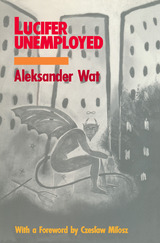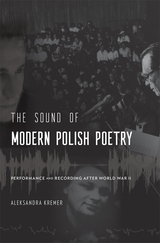
The title story finds a superbly ironic Lucifer wandering the Europe of the late 1920s in search of a mission: what impact can a devil have in a godless time? What is his sorcery in a society far more diablical than the devil himself? Too idealistic for a world full of modern cruelties, the unemployable Lucifer finally finds the only means of guaranteed immortality. In "The Eternally Wandering Jew," steady Jewish conversion to Christianity results in Nathan the Talmudist reigning as Pope Urban IX. The hilarious satire on power, "Kings in Exile," unfolds with the dethroned monarchs of Europe meeting to found their own republic in an uninhabited island in the Indian Ocean.

An illuminating new study of modern Polish verse in performance, offering a major reassessment of the roles of poets and poetry in twentieth-century Polish culture.
What’s in a voice? Why record oneself reading a poem that also exists on paper? In recent decades, scholars have sought to answer these questions, giving due credit to the art of poetry performance in the anglophone world. Now Aleksandra Kremer trains a sharp ear on modern Polish poetry, assessing the rising importance of authorial sound recordings during the tumultuous twentieth century in Eastern Europe.
Kremer traces the adoption by key Polish poets of performance practices intimately tied to new media. In Polish hands, tape recording became something different from what it had been in the West, shaped by its distinctive origins behind the Iron Curtain. The Sound of Modern Polish Poetry reconstructs the historical conditions, audio technologies, and personal motivations that informed poetic performances by such luminaries as Czesław Miłosz, Wisława Szymborska, Aleksander Wat, Zbigniew Herbert, Miron Białoszewski, Anna Swir, and Tadeusz Różewicz. Through performances both public and private, prepared and improvised, professional and amateur, these poets tested the possibilities of the physical voice and introduced new poetic practices, reading styles, and genres to the Polish literary scene. Recording became, for these artists, a means of announcing their ambiguous place between worlds.
Kremer’s is a work of criticism as well as recovery, deploying speech-analysis software to shed light on forgotten audio experiments—from poetic “sound postcards,” to unusual home performances, to the final testaments of writer-performers. Collectively, their voices reveal new aesthetics of poetry reading and novel concepts of the poetic self.
READERS
Browse our collection.
PUBLISHERS
See BiblioVault's publisher services.
STUDENT SERVICES
Files for college accessibility offices.
UChicago Accessibility Resources
home | accessibility | search | about | contact us
BiblioVault ® 2001 - 2024
The University of Chicago Press









